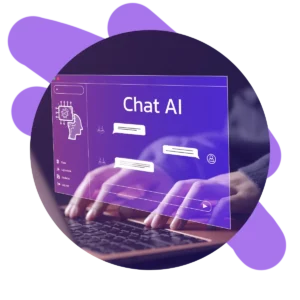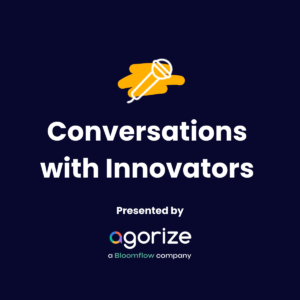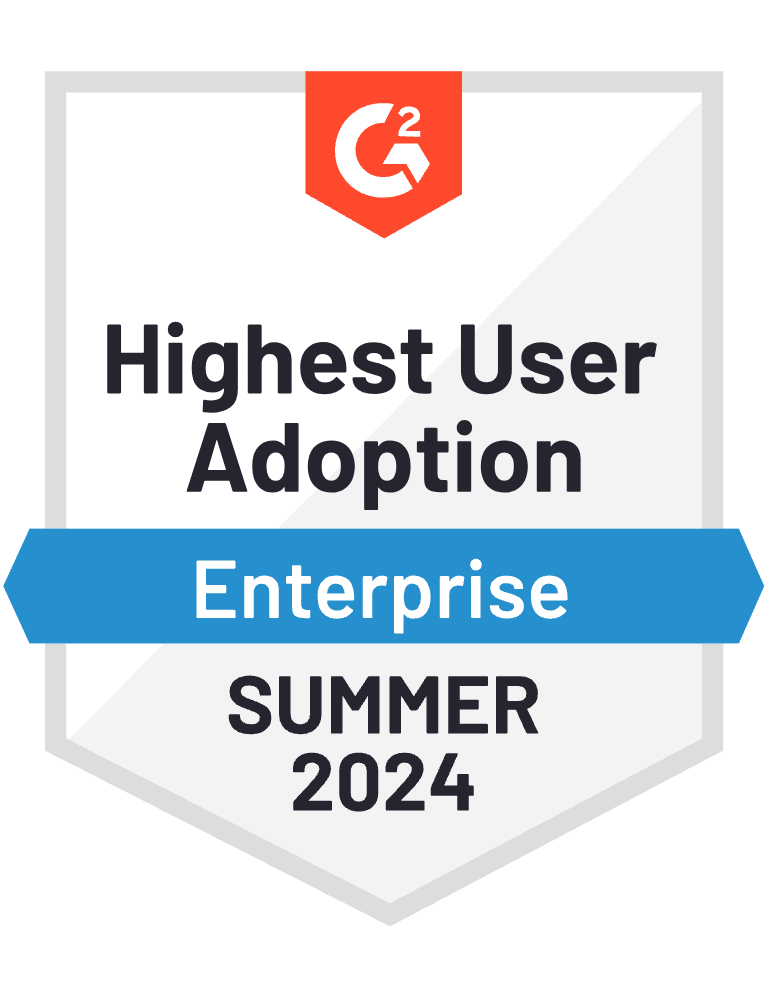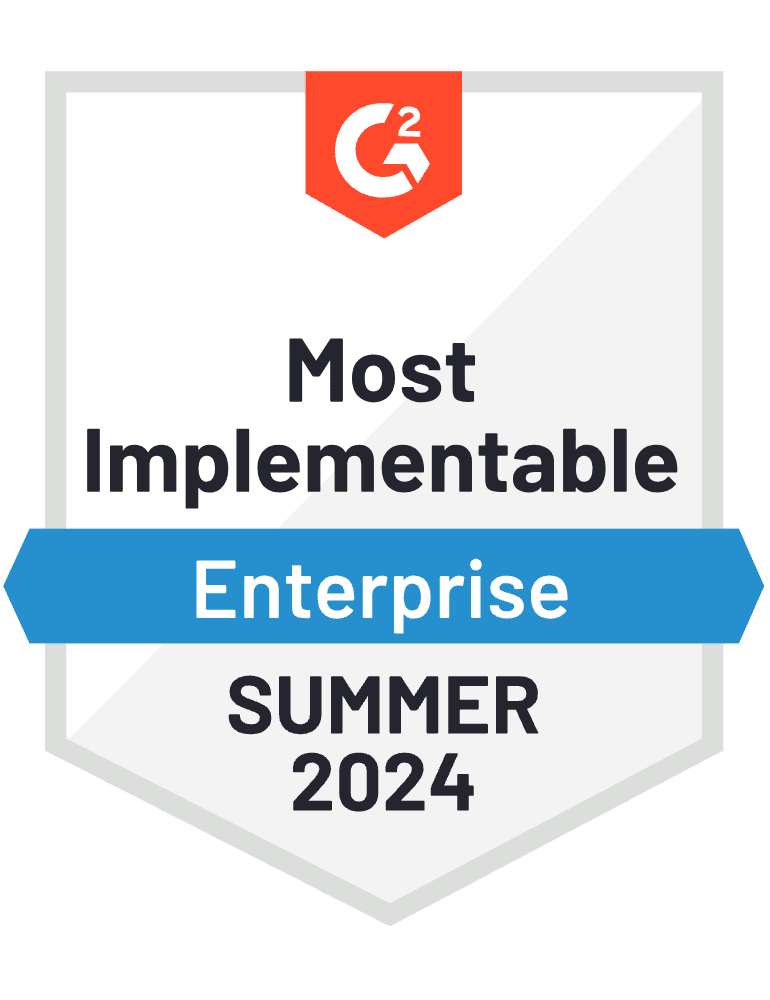In today’s digital era, artificial intelligence (AI) stands at the forefront of technological advancement. It reshapes industries and redefines the boundaries of what’s possible. From healthcare and finance to energy and FMCG, AI’s significance is profound. It offers transformative potential that catalyzes efficiency, innovation, and growth. As we delve into the world of AI, it becomes evident that AI ideas are not just concepts. They’re pivotal driving forces steering innovation and strategic development across various sectors.
And while Data executives and teams must pave the way for organizations to develop their capabilities, the days of data scientists being sole contributors are over. All employees must be included in the process of adopting an deploying AI projects. No matter your job title, everyone’s career is about to be a career in AI. So, how should leaders channel all the developments, arising needs, and opportunities in AI into transformative projects that create value? In this article, we break down how to source, adopt, and deploy AI ideas.
What is artificial intelligence and how should corporates leverage it?
AI is a broad field of computer science focused on creating smart machines capable of performing tasks that typically require human intelligence. For corporate professionals in data, transformation, innovation, and technology teams, AI represents a pivotal tool. It can drive efficiency, uncover insights, enhance decision-making, and foster innovative solutions across various business operations and strategies.
The continuous evolution of AI technologies, such as machine learning, natural language processing, and robotics, is driving significant advancements and efficiencies. By leveraging AI, organizations can harness data-driven insights, enhance decision-making, and create innovative products and services that meet the evolving needs of their customers and stakeholders. In this landscape, staying ahead of advancements is not just beneficial—it is essential for maintaining competitive edge and fostering sustainable growth.
AI 101: A quick reminder of key terms
Most of us are familiar with the different aspects of AI applications and processes. Or, at least, have heard these terms mentioned in meetings and presentations. In reality, when working on AI ideas and projects, not all of these topics will be relevant at the same time. Nonetheless, it’s useful to understand the key terms that are thrown around. For that reason, here’s a list of short definitions of key terms in the field.
- Machine Learning: An AI subset that enables systems to learn and improve from experience without being explicitly programmed.
- Generative AI: AI form that generates new data instances that are similar but not identical to the training data.
- Deep learning: A class of machine learning based on artificial neural networks with representation learning at multiple levels of abstraction.
- Computer vision: AI field that enables computers to interpret and make decisions based on visual data from the world around them.
- Natural Language Processing (NLP): Deals with the interaction between computers and humans using natural language.
- Predictive analytics: Use of data, statistical algorithms, and machine learning techniques to identify the likelihood of future outcomes based on historical data.
- Robotics: Technology branch dealing with the design, construction, operation, and application of robots, often incorporating AI for autonomy or assistance.
- AI ethics: The field of study concerned with ensuring that AI technologies are developed and used in morally acceptable and socially beneficial ways.

Adopting artificial intelligence ideas in 2024
When considering ideas and insights to inspire your next AI project, it’s crucial to think beyond conventional applications and explore transformative approaches. AI’s potential to analyze complex data sets can lead to groundbreaking solutions in various domains, such as personalized medicine, sustainable energy management, and advanced cybersecurity. For instance, AI can be utilized to predict customer behavior, automate tedious processes, or enhance user experiences through personalized recommendations. Additionally, by tapping into the collective intelligence of a platform like Agorize, organizations can crowdsource solutions, accessing a diverse pool of ideas that challenge conventional thinking. Whether it’s developing an AI-powered tool to optimize supply chains or employing machine learning algorithms to tackle social challenges, the key is to approach innovation with creativity, collaboration, and a deep understanding of the technology’s transformative potential.
Value created through AI
The potential outcomes of AI use are immense and vary greatly. Deloitte has established at least the following results that can be expected when adopting AI-based solutions into an organization.
Operational benefits:
- Improve efficiency and productivity: Optimize workflows, automates routine tasks, and enhances overall operational efficiency.
- Reduce costs: Cut operational expenses by automating processes and reducing the need for manual intervention .
- Shift workers from lower to higher-value tasks: It takes over mundane tasks. This allows employees to focus on more strategic and value-adding activities.
Product and service enhancement:
- Improve existing products and services: Provide insights that can be used to enhance the features, usability, and performance of products and services.
- Increase speed and/or ease of developing new systems/software: Accelerate the development process of new technological solutions. Consequently, making it quicker and more efficient.
Financial growth:
- Increase revenue: AI-driven innovations and improvements can lead to increased sales and new revenue streams.
- Detect fraud and manage risk: Predictive capabilities are crucial in identifying fraudulent activities and mitigating various risks, thereby protecting financial interests.
Innovation and client engagement:
- Encourage innovation & growth: Foster a culture of innovation, encouraging the development of new ideas and contributing to business growth.
- Enhance relationships with clients: AI-powered tools can provide personalized experiences and insights, improving client satisfaction and loyalty.
- Uncovers new ideas and insights: Reveal patterns and insights that were previously inaccessible by analyzing vast datasets, driving innovation and strategic decision-making.
Sourcing and deploying AI project ideas with internal and external innovation programs
To source and deploy AI project ideas effectively, companies should foster an environment that encourages identifying AI opportunities across departments. This identification process can be greatly enhanced through internal innovation programs that engage employees from different backgrounds and expertise, fostering a collaborative culture that is primed for innovation. By leveraging collective intelligence and diverse perspectives within the organization, companies can uncover unique AI applications that address specific business challenges and drive significant value.
Furthermore, the integration of external innovation programs can expand the horizons of AI project ideation and execution. These programs offer a platform for exchanging best practices and insights with industry peers, startups, and academic institutions. It enriches the company’s AI initiatives with a broader range of perspectives and experiences. By actively participating in these ecosystems, corporations can stay ahead of the latest trends and technologies. Simultaneously, they can identify potential partnerships and collaborative opportunities. External engagement not only accelerates the adoption of AI tools but also ensures that the company’s AI strategies are informed by a comprehensive understanding of the current and future landscape.
Innovation platforms for AI: Use cases
- Startup scouting programs: These programs enable corporations to discover and collaborate with startups at the cutting edge of technology. By engaging with these startups, companies can access solutions and approaches that may not be available in-house. As such, fostering a culture of external innovation and potentially leading to strategic partnerships or investments.
- Student innovation challenges: Hosting or participating in challenges aimed at students allows corporations to tap into the fresh, unconventional thinking of young innovators. These challenges can focus on specific problems or broader industry issues, providing students with the opportunity to showcase their talents while offering companies early access to the next generation of AI innovators.
- Employee idea boxes: Encouraging employees to submit their AI ideas through internal platforms uncovers hidden opportunities and promotes a sense of ownership and engagement. These ideas can range from incremental improvements to radical innovations. Both leveraging the diverse knowledge and perspectives within the organization to drive adoption and transformation.
- Peer-to-peer recognition and awards: Implementing recognition programs for AI innovations encourages employees to share their successes and best practices. By rewarding those who contribute valuable ideas and implementations, companies foster an environment where innovation is recognized, valued, and replicated across the organization.
The right innovation platform for the task
Not every innovation platform might be suitable for AI purposes. Ideally, a platform is secure, customizable and connected to a community of startups and innovators. These are some key features to look out for:
1. User-friendly interface: A platform should offer an intuitive and engaging user interface that encourages interaction and collaboration. This makes it easy for users of varying technical expertise to contribute and navigate project ideas.
2. Project management tools: To effectively manage projects, the platform should include features for tracking progress, assigning tasks, and facilitating communication among team members. Consequently, ensuring that initiatives are completed efficiently and successfully.
3. Knowledge sharing and collaboration: It is crucial for an innovation platform to facilitate the exchange of ideas, experiences, and best practices. Features like forums, wikis, or collaborative documents can help users share knowledge and collaborate on projects.
4. Data integration and analytics: Given the data-driven nature of AI, the platform should support data integration and provide analytics tools. These will help users analyze results, identify trends, and make real-time, data-informed decisions regarding projects.
5. Scalability and flexibility: As projects and organizations evolve, the platform should be scalable and flexible enough to accommodate growth and changes in project scope and complexity.
6. Security and compliance: Ensuring data privacy and security is paramount, especially for projects that may involve sensitive information. The platform should adhere to industry-standard security practices and compliance requirements to protect user data and intellectual property.
Case study: Microsoft, World AI Cannes Festival, Etisalat
Microsoft À Vous L’IA
Year: 2024-2025
Location: France
Target audience: Students, startups, SMEs, society at large
Challenge: Microsoft’s national initiative is designed to democratize artificial intelligence further and empower every individual with AI tools. The entire AI program is divided into four dedicated phases, which will address students, startups, SMEs, and the public at large throughout 2024 and into 2025. It includes training 100,000 individuals and organizing multiple hackathons to attract students and startups’ ideas. Learn more here.
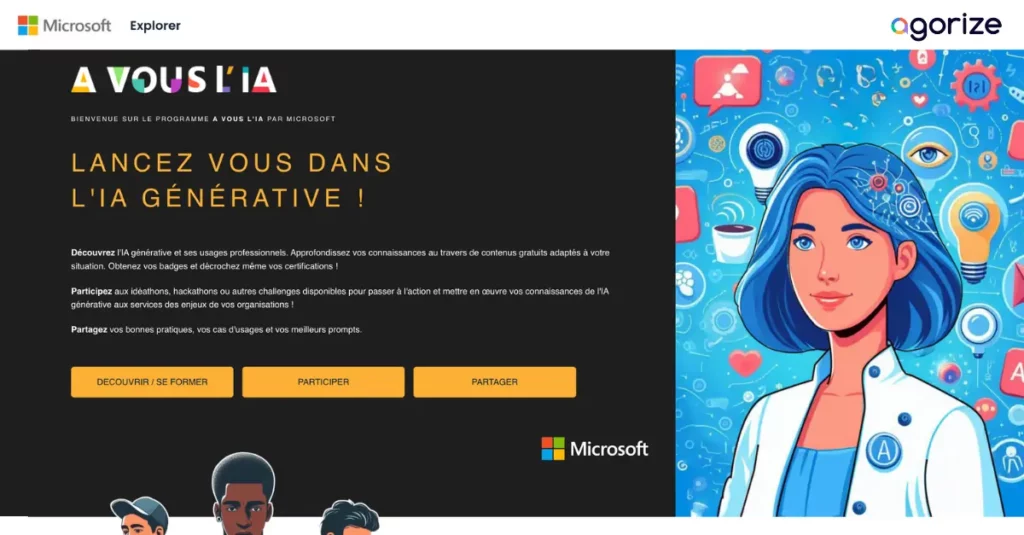
World AI Cannes Festival
Year: 2023-2024
Location: Global
Target audience: Startups
Challenge: The World AI Cannes Festival (WAICF) organized major innovation challenges that have significantly contributed to advancing the field of artificial intelligence. The partnership combines WAICF’s platform to showcase AI innovations and Agorize’s expertise in innovation challenges and startup scouting. As a result, they have made important developments in AI technology. Learn more here.
Etisalat
Year: 2021-2022
Location: United Arab Emirates
Target audience: Students
Challenge: Etisalat Group wanted to recruit 100 Emirati graduates in response to the UAE government’s national NAFIS program. They invested in Emirati cadres and support the career path of the people of the country in the digital fields based on the extensive experiences that the company possesses in those fields. Learn more here.
Conclusion
AI’s application transcends the confines of data science departments and must reach every facet of organizational structure and strategy. Thankfully, there are various innovation-based solutions to achieve this. As we navigate the complexities of AI adoption, it’s clear that fostering a culture of continuous learning, collaboration, and experimentation is key to unlocking its transformative power, ensuring that companies not only keep pace with technological advancements but also lead the charge in innovation.
To this end, leveraging internal and external innovation programs emerges as a strategic tool. It enables organizations to tap into a rich ecosystem of AI project ideas and collaborations. From startup scouting programs to employee idea boxes that democratize innovation, the avenues for sourcing AI projects are as diverse as they are impactful. Moreover, the integration of platforms that facilitate knowledge sharing, project management, and cross-industry collaboration. Consequently, ensuring that AI initiatives are nurtured within a supportive ecosystem, optimizing their potential for success. As organizations embark on this journey, the integration of AI becomes not just a strategic enhancement but a cornerstone of future-ready, resilient, and innovative organizational DNA, ready to thrive in an increasingly AI-driven world.
You can make your next AI move with Agorize. We help you discover and implement the best AI use cases for your business, using our platform. Get in touch to learn more.

